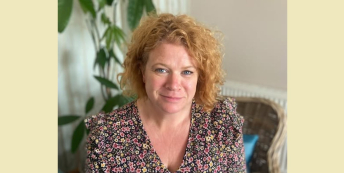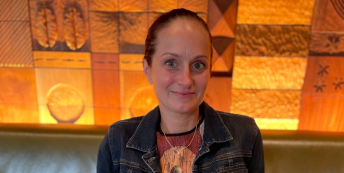“The feeling of constantly chasing my tail became overwhelming.”

What work were you doing previously?
I was a secondary school English teacher.
What are you doing now?
I work as a care practitioner in a residential children's home.
How did you feel about your work before you decided to make a change?
Some aspects of teaching I loved, while others frustrated me.
I'd never planned to be a teacher. I graduated from university with a first-class English degree and applied for a range of jobs, including one as an unqualified English teacher.
There was a lot of learning on the job, especially with things like behaviour management.
I would regularly tell myself it would be the perfect job 'when I finished my training' or 'when I've planned all my lessons' or 'when it's the six-week summer holiday' or 'when I've got a family'.
Eventually I had to admit to myself that it wasn't making me happy right now.
During my final full year as a teacher I knew I would be leaving my current post due to relocation. I had a lot of frustrations that, at the time, I put down to the school I was working at. But when I started at my new school that September, I became aware that many of these frustrations were with teaching itself.
I soon realised I didn't want to do it anymore.
Why did you change?
I wanted to be able to leave work at the door.
I wasn't expecting a job to make me happy, but at the very least I thought it shouldn't make me unhappy. And I had come to feel like there weren't enough hours in the day to do the job properly.
My timetable gave me four free periods a week. With six classes, I would need to plan 21 lessons and mark nearly 200 books. I would get into school before 8 a.m. and no matter what time I left I would feel like I hadn't scratched the surface of the list of things I needed to do.
The feeling of constantly chasing my tail became overwhelming in time.
When was the moment you decided to make the change?
I'd had a bad start to the term, a bad week and a bad Friday.
When I drove the 40 miles to work on the following Monday morning, I pulled over into a nearby petrol station and realised I couldn't face going in. I'm not sure whether you would call it stress, burnout or something else, but I knew almost immediately that I was never going to go back.
By the end of that week I'd met the headteacher and given my notice.
I felt guilty leaving colleagues and students midterm, but I felt staying any longer would put my own well-being at risk.
I felt strangely relieved and at peace with my decision once I'd walked away. I had no idea what I was going to do next but, as someone told me, "If you don't take any roads, you'll never get out of the forest".
Are you happy with the change?
I'm really happy with the change.
It was far from straightforward, but I've managed to find a role where I can leave work at the door.
I'd never considered working in care, but my days now often involve playing football and taking the young people out for activities instead of reading poems and marking. The role is really varied and also involves helping young people with day-to-day activities like cooking and cleaning.
Working in care, I feel like I'm making a difference. In teaching, I often felt too stretched to ever truly give the students the time they needed.
What do you miss and what don't you miss?
As obvious as it sounds, I do miss actually teaching.
I really miss those Key Stage 3 lessons where there was no pressure and plenty of time to build a rapport with students. I'm lucky that a lot of the things I enjoyed about teaching are still applicable in my new role.
I don't miss the 'results factory' mentality of teaching and the unrealistic pressure applied by senior staff to achieve this. I don't miss the anxiety of other adults scrutinising my work. I don't miss taking several sets of books home to cram-mark in one night before an observation.
I also honestly never felt knowledgeable enough to teach English. My passion in English is writing, but at times it felt like the curriculum was heavily focused on literature. I would often be teaching texts I hadn't read before and depending on my workload at the time, I would be in the classroom reading the text for the first time with the students.
I thought I would miss the holidays and I wasn't sure if shifts would suit me. I now work two fifteen-hour shifts and one ten-hour shift a week, meaning I get four full days off every week. I wasn't sure if I would enjoy the long hours but, now, I often don't feel like I'm at work.
I also find I have a lot more free time now. With the generous holiday allowance, I work fewer actual days in the year than if I was teaching.
I've found that I can relate to my colleagues a lot more and that they're more supportive. It feels like we are all on the same team and, as silly as it may sound, it's nice having casual conversations with colleagues, rather than just offloading about bad lessons and disruptive students.
More than anything else, I feel like I'm a much closer version to myself when I'm in work. I found myself as a teacher doing and saying things that I thought others would say, or wanted to hear.
How did you go about making the shift? And how specifically did you choose your new career?
Within the space of a week I went from being an employed, qualified teacher to being unemployed and having no clue what my next steps were.
I applied for loads of jobs and didn't anticipate a delay in finding new work. I wrote a list of things I wanted in a job and things I didn't. I wrote down my skills and brainstormed possible career paths.
I felt I had transferable skills but the lack of replies to my applications meant my optimism soon began to fade.
I read every single article on the Careershifters site about teachers who'd changed careers. It was massively reassuring hearing stories from ex-teachers who'd managed to articulate the pitfalls of teaching in ways I hadn't yet managed.
When I applied for the position of Care Practitioner, I wasn't entirely sure what the role involved. I was also sceptical about whether this was the sort of role I would enjoy or if I even wanted to work with young people again.
What didn't go well? What 'wrong turns' did you take?
At times when I was looking for work, I worried that I'd made a mistake by walking away from a well-paid job without anything else lined up. I was also worried and self-conscious about people thinking badly of me for not working.
I spent four weeks religiously searching and applying on job sites which, in hindsight, isn't the most productive way to spend your time and find a job.
How did you handle your finances to make your change possible?
I managed to make my final wage last for ages by simply being vigilant with what I spent.
I was lucky to be in a position where I live with my partner in her parents' house, so our financial commitments were minimal. I also had a fair amount of savings that I knew I could use if necessary.
None of this stopped me feeling guilty about not working and not having a wage coming in at the end of the month, though.
I thought I'd miss the money and sometimes I do think nostalgically about the teachers' pay scale and what I could have earned. But even though I'm on slightly less money than I was when teaching, I haven't noticed a difference, and I find I spend less money than I did before anyway.
What was the most difficult thing about changing?
I felt pressure to get another job quickly.
Whether it was in my head or not, I felt judged for leaving a well-paid job with no alternative plan.
I found it really hard to articulate to people why I'd suddenly changed jobs. As I'd never really spoken about my professional unhappiness before, I was aware it may have felt 'out of the blue' to some family and friends.
What help did you get? 
I'm lucky to have a really supportive partner.
She just got it. I think she realised I hadn't been happy at work for a while, and if leaving teaching meant that I would be happier, then she was completely behind any decision I made. It meant a lot that I felt her unconditional support, especially when I felt others didn't really understand my situation.
We were in the process of looking for a house to buy, so leaving my job postponed these plans but she still was nothing but supportive. Also, when I told my Mum I was going to quit, she simply said: "Do what makes you happy."
After that there were no doubts in my mind.
What resources would you recommend to others?
As I said, I read every single success story on Careershifters about teachers who had changed careers.
I found it a huge relief to know I wasn't the first person to feel like this.
I also read a book called Fuck It, Do What You Love, by John Parkin. It reassured me that, even though I hadn't found the correct path yet, I was at least closer to it and that the decisions I'd made up until that point were the right ones.
What have you learnt in the process?
I've learnt that nothing needs to be forever and things change.
I think that, in my head, I had imagined being a teacher forever. So the thought of being 'back at square one' was quite overwhelming.
I feel confident now that if I ever stopped enjoying working as a care practitioner, I would feel comfortable walking away and finding something that suits me better.
What do you wish you'd done differently?
In hindsight, it would have been more beneficial to have tried to find a new job in the six weeks after leaving my first school.
If I'd been more honest with myself, perhaps I would have realised that moving schools was not the answer.
What would you advise others to do in the same situation?
Go for it.
There are alternatives to teaching and you might not miss the six-week holidays as much as you think.
Lean on family and friends for support and don't worry if not everyone understands your motives.
Trust your gut instincts and be honest with yourself. Do what makes you happy.
What lessons could you take from Michael's story to use in your own career change? Let us know in the comments below.



